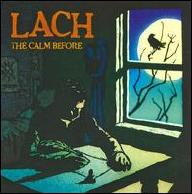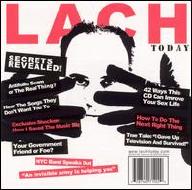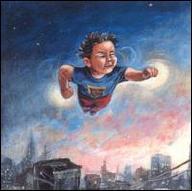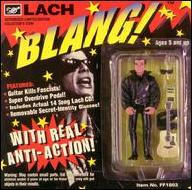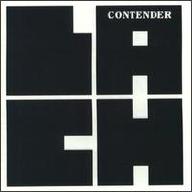Born in Brooklyn and raised in suburban Rockland County, Lach started playing classical piano at a very young age, but gave it up in his teens when he discovered early British punk bands like the Sex Pistols, the Clash, the Damned, and the Jam. From there he branched out to explore rock history, in particular the Beatles and singer/songwriters like Bob Dylan and Lou Reed, and from there folkies like Phil Ochs and Woody Guthrie. He went to college, dropped out for a year to live in Las Vegas, then went back to school at Boston University, where he met bassist Geoff Notkin. The two soon dropped out and moved to Rockland County, where they formed a punk band called Proper Id circa 1979. The group played several gigs at CBGB's, but weren't quite stable enough to make much of an impact.
Lach eventually moved into the city, specifically Manhattan's Lower East Side, and switched his focus to folksinging, albeit with a confrontational, punk-derived attitude. He was met with outright hostility in the conservative folk clubs of Greenwich Village, which deemed him too fast, too loud, too profane, and too negative -- and even kicked him off stage occasionally. Frustrated by those audiences' narrow definition of folk music and the tone of sincerity and naïve optimism they seemed to prefer, Lach started an unlicensed after-hours club of his own called the Fort, which quickly became a popular hangout for misfits of all stripes. It also spun off an Anti-Folk Festival in response to the mainstream New York Folk Festival. Liquor laws eventually forced the shutdown of the Fort in its original incarnation, but Lach moved the club to several legitimate pre-existing venues, and it eventually settled into a home at Sophie's Bar, where it earned substantial attention in hipster circles (and boosted the nascent career of Michelle Shocked).
Anti-folkers Roger Manning and Kirk Kelly both signed to the legendary punk label SST and issued albums in 1988, sparking a new wave of outside interest in the scene. Promoting his own music in addition to other artists', in 1990 Lach followed in the footsteps of the Washington Squares and signed with GoldCastle Records, which was owned by Nirvana/Bonnie Raitt manager Danny Goldberg. Lach's debut album, Contender, was released later that year, with wider distribution through Capitol. Reviews ranged from ecstatic to promising but uneven, but it was generally well-received. Unfortunately, GoldCastle went out of business a few months later.
Highly discouraged, Lach took an extended break from the New York scene, and moved to San Francisco for a few years. While there, he recorded a tune called The Hillary Clinton Song at home on his four-track; airplay on local NPR (and later in Arkansas) helped lead to the release of a supporting EP, Family Values Pack, on the small Crystal Egg label. In 1993, Lach returned to New York, not intending to stay, but was offered a chance to restart the Fort in the backroom of the Sidewalk Cafe. He accepted, and soon instituted the Anti-Hoot, a weekly open-mic night designed to showcase a different breed of singer/songwriter: amateurish but personal, idiosyncratic but truthful. Some of the best performances by these artists (including a couple by Lach himself) were compiled in 1996 as Lach's Antihoot: Scenes From the Fort at Sidewalk Cafe, the inaugural release on Lach's newly formed record label Fortified. It was followed by albums from comedian Rick Shapiro and folksinger Major Matt Mason USA; along with artists like the Moldy Peaches and Nellie McKay, they helped breathe new life into the scattered and/or dormant anti-folk scene.
Lach himself finally returned to recording in 1999, issuing just his second full-length album, Blang! on Fortified. Blang! displayed his growth and maturation as a songwriter in the intervening decade, and featured his new backing band of ex-Television drummer Billy Ficca and bassist Roy Edroso (late of the Reverb Motherfuckers). Back into the swing of things, Lach followed it with his third album, Kids Fly Free, in 2001, a relatively scant two years later. He toured England in support, and the album was eventually licensed for U.K. release by Track Records. His fourth album, Today, arrived in the spring of 2004. ~ Steve Huey, Rovi


